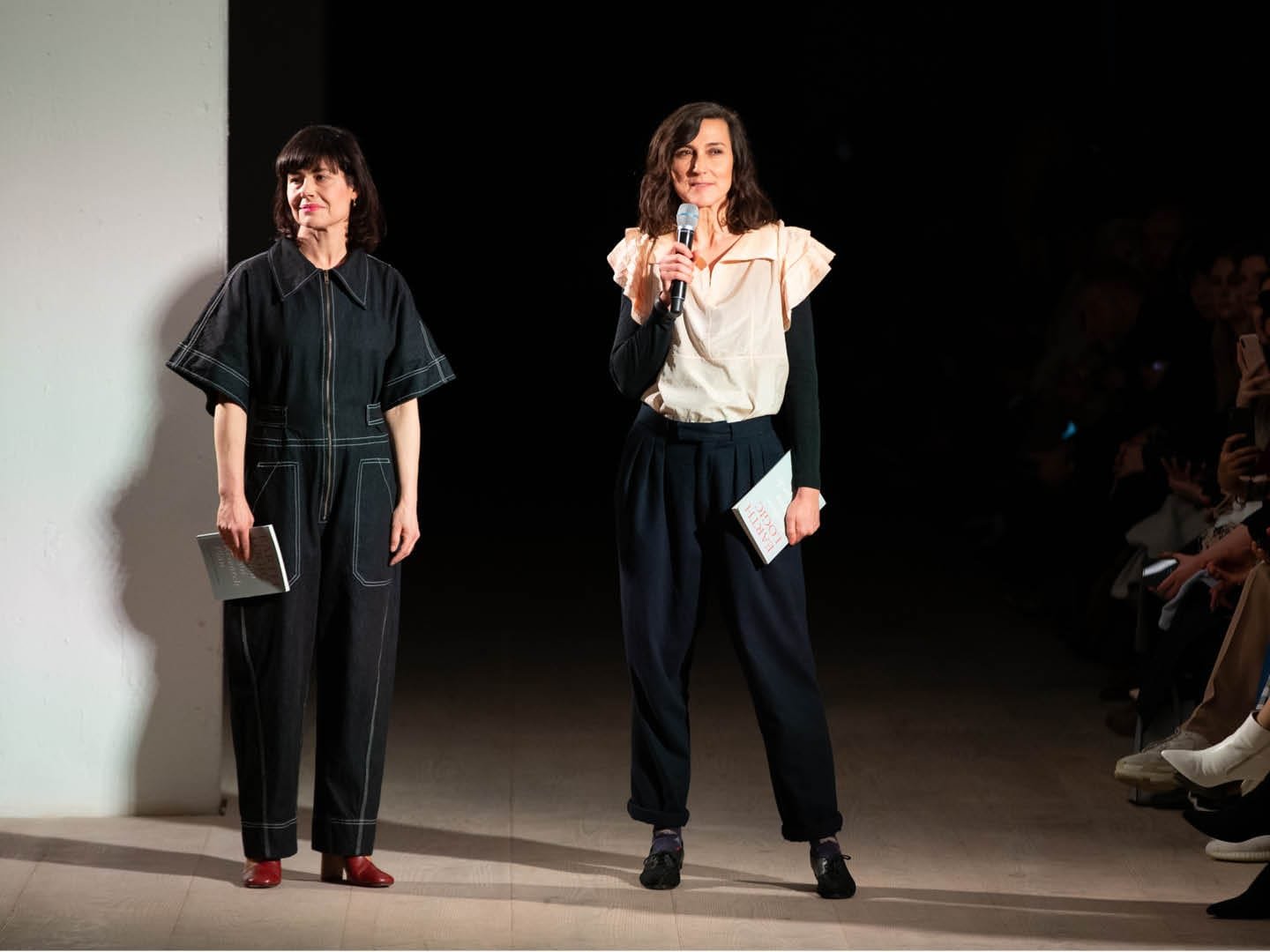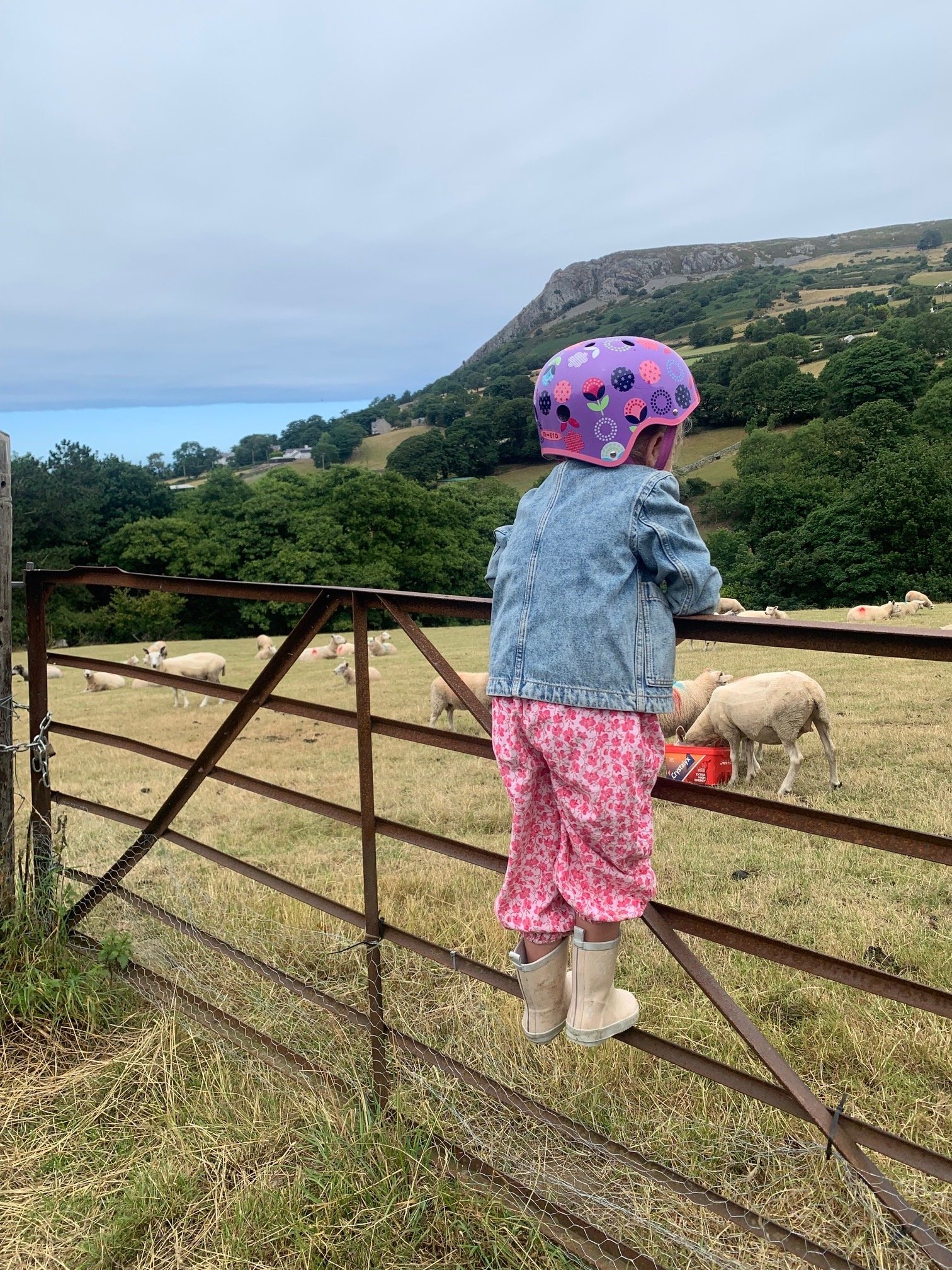The art of looking back to inform the future of Welsh wool: A conversation with Kate Fletcher and Mathilda Tham
Source: Mathilda Tham and Kate Fletcher. Launch of ’Earth Logic’ London Fashion Week, February 2022.
by Meg Pirie
I’m adjusting frames in our beehive, replacing some of those the bees have capped with empty ones, a successful strategy so far in mitigating the bees from swarming. As I go about this process, slowly and methodically, I’m reminded of how seasonally bees operate, from collecting pollen to offloading this to awaiting cells. This is knowledge transfer, community and localism in motion, if only this process of collaboration could be magnified and harnessed.
Wool is an age-old fibre, one that has been cultivated in Wales for thousands of years. This is entrenched so far into Welsh culture through place names and desolated mills that pepper the landscape, as well as the streams and rivers that meander down from the mountains, once a source of power. So much knowledge exists in this place, from the carders and spinners to the weavers and mill owners.
So much of this is tangled in the word ‘Hiraeth’, an untranslatable Welsh word often rendered for a type of longing for home and the knowledge and culture woven into this. Although untranslatable, this word is not untenable, I myself have experienced the feeling, the more I have connected to the roots of Welsh community and culture.
This action of looking back, is like a mirror reflecting my thoughts forwards to the ground-breaking work of Kate Fletcher and Mathilda Tham, two of the world’s most cited scholars in textiles and sustainability. Their work on the ‘Earth Logic Fashion Action Research Plan’, puts the health and survival of Earth before economic growth, therefore upending existing priorities.
As I Zoom called with them both one balmy Spring afternoon, I am instantly reminded of why I so desperately wanted their viewpoints as both Kate and Mathilda share the complexity of working within planetary boundaries with such clarity that I could indeed listen all day.
We start with Kate weighing in on wool within Wales’ localism narrative. Kate said:
“Wool definitely plays a part in the localism narrative of Wales. It’s certainly one of the region’s fibre crops, and I suppose therefore it’s part of its fashion direction. However, it’s not like this is uncomplicated, because of course we know the impacts overgrazing has on the health of ecosystems.
“I think it's definitely a question of allowing small farmers to stay on the land, it's about good land stewardship, it's about building different sorts of relationships for the long term, that foster wellbeing both for human communities and also natural ones.
“And maybe it's also the reordering of priorities. So that, once again, we realise that the thing that supports humans here, is its other ecosystems and in a very simple, quite frankly, hierarchy where nature is at the top and then industrial priorities flow from that.”
Source: Kate Fletcher. Earth Logic Local Fashion Governance workshop, October 2021, Lancaster, England.
The power of Wales
While Kate is speaking I think about the role sheep can play within a healthy and ecologically balanced system. The potential power Wales has is that its farms are made up of far smaller land holdings and could offer the potential for climate mitigation to happen at a faster pace than perhaps England who is known for larger land holdings. While wool itself is inherently sustainable the farming process is not always so, requiring much work on supporting best practice from a policy level.
To this point, a recent report by The Green Alliance Trust, suggests a Land Use Framework, could assist farmers to use the least productive land as a carbon sink, producing the majority of food on the most productive land, and supporting farmers to boost incomes through payments that support more space for nature onto their farms.
The report goes on to state that to date the Westminster Government has looked at shorter-term solutions such as a Stewardship Scheme which does little to assist farmers with longer-term viability such as a framework which combines food production with income from climate and nature benefits. Suggesting the need for a vision from the Westminster Government which realises the need for strategies which support Welsh environmental and social values.
Mathilda had been listening intently to Kate until now, their relationship symbiotic, an ebb and flow, building on each other’s points with respect and cohesion. Mathilda said:
“I think it’s really important to recognise that the current market logic has not been a successful broker of different needs.
“So it doesn’t manage to meet the farmers’ needs for good livelihoods, for workers’ needs for good and safe livelihoods in other countries, or to protect our environment. Therefore we think it’s also dangerous to look at this as a market issue.
“It’s really important to step back and think about what are the real authentic needs here. An authentic need is for farmers to have livelihoods, an authentic need is to live within planetary boundaries.
“It’s really important that we recognise those as the authentic needs and don’t confuse them with market needs. ‘We need to stay with the trouble, as we would say,’ using the term coined by Donna Haraway.”
It is imperative to note Mathilda’s point about the issue within the sector not being confused with market needs. Farmers are currently receiving so little for their wool and the lack of transparency in globalised supply chains allows potential for labour violations. Ostensibly, the current growth logic is working at a level that affects environmental and social implications further.
‘Staying with the Trouble’
The other point of reference to note is multispecies feminist, Donna Haraway’s book ‘Staying with the Trouble’, which acts as the theoretical underpinning for Kate and Mathilda’s Earth Logic work. Reminding us that change will come only if we authentically commit to putting the earth first, even when this causes friction.
This idea of ‘staying with the trouble’ means that every decision made requires an earth-first focus. While this is a necessary direction in the climate crisis, I can’t help thinking about how we could continue to value the culture and knowledge woven into the Welsh woollen industry with an earth-first perspective.
Source: Kate Fletcher. Earth Logic at Stockholm+50, Handling Our Future With Care event, June 2022, Stockholm, Sweden.
We got onto talking about the diversity of approaches happening across the sector. As I sit in the balmy sun, I reflect on my journey around Wales and the conversations I’ve had with mills and farmers, natural dyers and those who are pushing against the grain of how we’ve always done things.
So many of the stories I have heard have drawn on the traditions, with wool being so connected to the place that is Wales. A cultural fibre rooted in localism where farmers had wool made into clothes and blankets for their families first before taking the rest to mills for commercial purposes. A clear example of localism in motion and an authentic need being met.
Mathilda snaps me out of my moment of reflection. Mathilda said:
“I think it’s really important to be careful about nostalgia. When we talk about a place it’s really important to honour knowledge, skills and traditions, and also be able to move with the needs so that they can truly flourish.
“We gain strength from a diversity of approaches, it’s a real problem that the ambition level of policy is low.”
Welsh wool would be particularly suited within a localised supply chain involving a ‘return to its roots’ outlook. However, with the closure of mills across the country, there is a real sense of Wales’ losing its identity and connection to wool as a fibre, suggesting a diverse range of solutions are required. At its root, localism allows for knowledge, cultures and practices to be shaped by a region’s natural factors and the provenance of Wales and its place-specific knowledge is particularly valuable.
Even so, this must meet the needs of its communities today, while preserving this culture and knowledge. Kate, who has spent years researching, writing and pioneering around the topic of localism, adds that the policy connecting these diversity of approaches is critical for the appropriate adaptation to specific geographical places. Kate said:
“It seems that when things are adapted to place and power is redistributed away from globalised centres and towards local communities and particularly to workers then really different decisions are made.
“So there becomes a cap on growth and other things which are limited and shaped by the authentic needs of life; that's where the power comes from local things.”
As I wrap up the interview, I am conscious of the mammoth job the Welsh Government has on their hands. While the government has a task of creating opportunities for its communities, without encroaching on planetary boundaries, there is much diversity in the sector and no visible care from a policy level in connecting this diversity across the country.
As a journalist I am conscious that so much media attention is directed towards the consumerist mindset of growth, but what Kate and Mathilda are suggesting is a complete step back and a reordering of priorities, meaning the responsibility for change is on us all. With so much of the Welsh woollen industry fragmented, this impedes on a revaluing of wool as Wales’ regional fibre crop in a localised way.
Source: Writer’s little girl in Llanfairfechan.
The next generation
Later when I pick up my dictaphone to make sense of this, a new recording flashes back at me. As I press ‘play’ my five-year-old little girl’s voice talks back,
“Sheep are everywhere in Wales, we must use wool because it’s cosy and warm and will last forever.”
While an accurate and simple statement, this knowledge of longevity at such a young age is power. Later that day we spent some time reading the Lorax, a book about a man who cuts down every tree in his quest to grow his business.
“Why make so much mummy, why not just make what they need?” she asks.
Children have such an innate way of knowing. The future of the next generation requires different ways of working, particularly within the climate crisis. A question comes to me, if the Welsh Government took the stance of ‘staying with the trouble’ where would we end up in the next ten years?
Kate’s statement rings in my ears:
“There’s this sense of travelling up and down the system scales all the time and that is the work here.”




